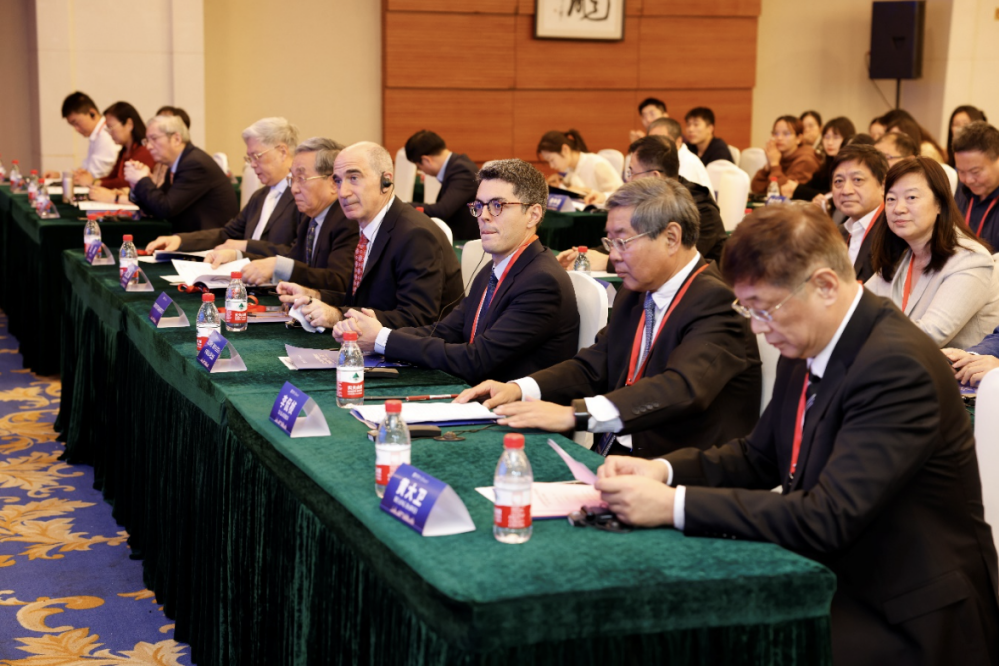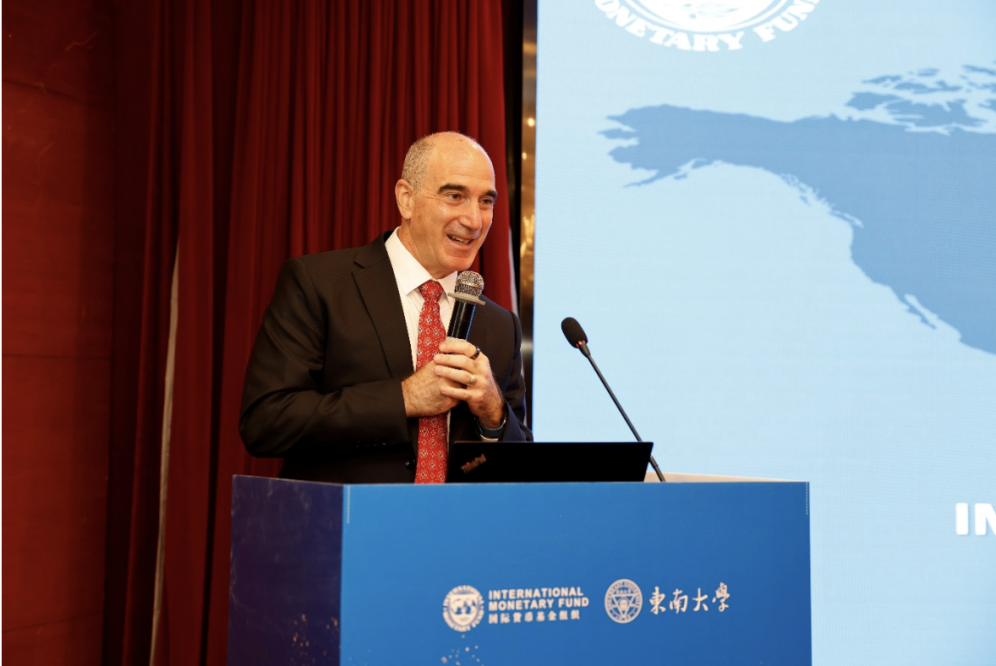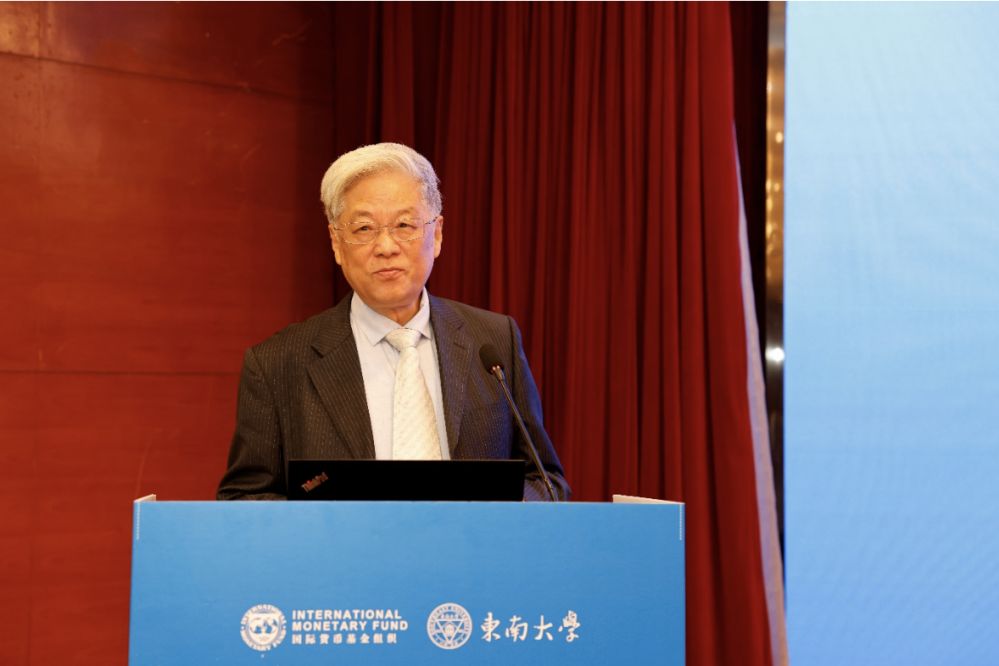On the morning of October 16th, the "2023 International Monetary Fund (IMF) World Economic Outlook Report Press Conference" was grandly held in Nanjing, which was hosted by the International Monetary Fund Representative Office in China and the School of Economics and Management of Southeast University, co-organized by the Institute of Digital Economy and Technological Innovation of Southeast University, the Macroeconomic Society of Jiangsu Province, and co-sponsored by Southeast University MBA Alumni Association.

Steven Alan Barnett, Chief Representative of the IMF in China, Mehdi Benatiya Andaloussi, economist at the IMF Research Department, Zhang Zhixiang, Former Director of the International Department of the People's Bank of China and Former Executive Director of China at the IMF, Jin Bei, member of the Chinese Academy of Social Sciences, the Society of Macroeconomics of Jiangsu Province President Li Kanzhen and Xu Kangning, Chief Professor of Southeast University and Vice President of the China World Economics Society, attended the meeting and delivered speeches. More than 100 experts and scholars from financial management departments, scientific research institutes, and the financial industry attended the press conference. The meeting was chaired by Pu Zhengning, Deputy Dean of the School of Economics and Management of Southeast University.
Huang Dawei, a member of the Standing Committee of the Party Committee and Vice President of Southeast University, delivered an opening speech. He mentioned that the current downward pressure on the economy has increased significantly, and the impact of external uncertainty has intensified significantly. At the same time, global financial integration continues to advance, and the interdependence and permeability between economies are increasingly deepening. Under this background, the 2023 International Monetary Fund (IMF) World Economic Outlook Report Press Conference was released as scheduled, which is of far-reaching significance! He said that expanding the policy horizon from the short term to the medium and long term and promoting the cross-cyclical design and regulation of monetary policy will help build a new development path that enhances economic resilience and promotes high-quality economic development. This press conference will conduct research and judgment on global economic development trends from a theoretical and macro perspective. Southeast University will also work with domestic and foreign institutions such as the International Monetary Fund to contribute wisdom to world financial stability and regulatory strategies, fiscal and monetary policies, etc.

Mr. Steven Alan Barnett, Chief Representative of the IMF in China, first delivered a keynote speech. He pointed out that the world economy will be full of resilience in 2023, but the scarring effect of the post-epidemic economy has generally appeared.According to the latest forecast, global economic growth will slow down from 3.5% in 2022 to 3% this year and 2.9% in 2024. However, China is still the largest engine of global economic growth, contributing one-third of global growth. After the epidemic, the scarring effect is more obvious in low-income developing countries, especially the least developed countries, which have been harmed to the greatest extent, leaving permanent scars. The economic growth forecasts of various countries are divergent, with the economic growth slowdown in developed economies being more obvious.
Secondly, he pointed out that inflation in many countries is much higher than before and was forecasted to gradually decline. It can be seen that the economy has basically achieved a "soft landing" without a recession, which reflected the efforts of the central bank and all parties. China's inflation is different from the world's rules. It has not increased significantly but has been maintained at a relatively appropriate level, approximately 2.2%. At the same time, he also pointed out that the tightening cycle is basically over, but inflation in most countries is unlikely to return to target levels before 2025.
In addition, Steven Barnett pointed out that the current global growth prospects are weak, especially in emerging markets and developing economies. Amid slowing economic growth, rising interest rates, and shrinking fiscal space, more structural reforms are needed to boost total factor productivity. He also pointed out that global trade has always been an important driving force for economic growth, and called on countries to strengthen cooperation and use the digital economy to drive global economic integration.
Finally, Steven Barnett called on everyone to remain optimistic and believe that the world can work together. For example, the IMF provided interest-free loans during the epidemic and took positive actions on climate, and it enhanced the resilience of the economy and combat the current challenges the economy is encountering.

Then, Mr. Mehdi Benatiya Andaloussi, the economist from the IMF Research Department, delivered a keynote speech. He pointed out that commodities are closely related to macroeconomics, their production is highly concentrated, its demand is wide and difficult to replace. In particular, suppliers of minerals and grains are concentrated in a few countries, leading many countries to rely heavily on imports of bulk commodities from a few supplier countries. Geo-economic fragmentation may lead to turmoil in commodity markets such as key minerals and agricultural products, triggering significant price fluctuations. Market fragmentation also makes the green transition of various countries more costly. Therefore, countries around the world should strengthen international cooperation, establish a "corridor" of agricultural products and mineral products to ensure the safety of agricultural products and share data on key mineral products, thereby improving the efficiency of commodity trade, improving the response capabilities of various countries, and accelerating green energy transformation.

Subsequently, Professor Jin Bei, a member of the Chinese Academy of Social Sciences, delivered a keynote speech on economic forecasts and economic prospects. He pointed out that the traditional macro-micro paradigm is short-term, focuses on the demand side, and is based on instrumental rationality. On this basis, a model can be established to predict future values based on three major categories of data: price, growth, and money volume. He emphasized that economic forecasts and prospects for the future must be more realistic and longer-term and that changes in China's current technological structure, demographic structure, etc. must be paid attention to, which will profoundly affect China's economic growth.

The discussion session was hosted by Zhang Zhixiang, former director of the International Department of the People's Bank of China and former executive director of China at the IMF. Steven Alan Barnet, chief representative of the IMF in China, Mehdi Benatiya Andaloussi, economist at the IMF Research Department, Jin Pei, member of the Chinese Academy of Social Sciences, Li Kanzhen, President of the Society of Macroeconomics of Jiangsu Province, Xu Kangning, Chief Professor of Southeast University and Vice President of the China World Economics Society, and other participating guests discussed the most urgent issues that need to be solved in the development of the world economy, geo-economic fragmentation and how to view the Chinese economy.
During the seminar, Chairman Li Kanzhen said that although the global economy is currently hindered, as far as Jiangsu is concerned, the number of people looking at houses and subscribing to real estate is increasing, and the production and sales of new energy vehicles are also booming. It can be seen that consumer confidence is gradually recovering, so he still maintains a positive attitude toward our country's economic development. Professor Xu Kangning pointed out that the IMF's forecast for China's economic growth ranks the top among major economies. It can be seen that although China's economy has bid farewell to the double-digit rapid growth stage, the real economy still has strong resilience. Based on the background of premature aging in our country and the structural transformation of the growth model, he believed that the government should introduce relevant policies to encourage more consumption while improving real estate demand and promoting high-quality economic development.

It is understood that the World Economic Outlook Report is the IMF's flagship report, which introduces the IMF's analysis of recent and medium-term global economic development and is published twice a year. The report involves a summary and analysis of regional economic problems in developed countries, developing countries, and emerging market countries, and proposes solutions to pressing topics in the current global economy. The analysis and forecasts in the World Economic Outlook are important references for understanding the global economic system and international financial markets.
(Text: Qiu Yiman Photo: Hang Tian)
Translated by: Wang Xuanyu
Reviewed by: Tang Feng

